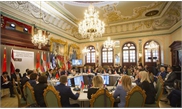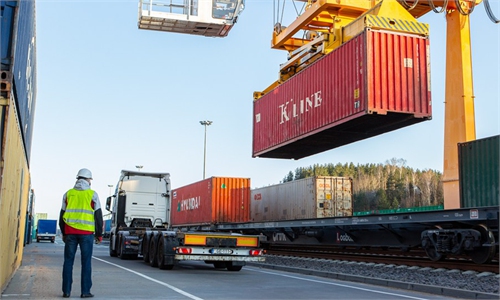Lithuania becomes pivot point for spreading Xinjiang-related lies: Chinese researcher

View of Vilnius, capital of Lithuania Photo: VCG
With Lithuania bowing to pressure from the US by withdrawing from the China-CEEC 17+1, the Baltic nation has become a pivot point in spreading Xinjiang-related rumors, showing that some politicians and media in the country are willing to spread false information, according to the latest findings of a Chinese researcher.
Li Baiyang, a member of the team conducting "Research on Basic Science Issues of National Security Management Decision-Making Systems" and a postdoctoral fellow at the Information Resources Research Center of Wuhan University, told the Global Times on Monday that with the help of the GDELT news research tool, Lithuania has become the country with the highest number of reports about so-called "genocide" in Northwest China's Xinjiang Uygur Autonomous Region.
The country has now become a "pivot point" for spreading Xinjiang-related reports, Li said. His comments came shortly after Lithuania's parliament passed a resolution on Thursday to describe China's treatment of Uygurs in Xinjiang as "genocide" and a "crime against humanity."
Created by Kalev H. Leetaru, a senior fellow at George Washington University, the GDELT system monitors the world's news media in over 100 languages, from January 1, 1979 to the present day, with daily updates.
"The Lithuanian media has limited capabilities in terms of creating their own news, which also has a lower presence in global public opinion. So it takes anti-China information as a major focus, which can bring a number of cited reports," Li said, noting that the active cited reports also meant some local politicians and media were playing an active role in spreading fake news about Xinjiang.
This is not the first time Lithuania has provoked China over Xinjiang. On April 22, Lithuania's parliament held a so-called testimony on China's human rights issue by inviting seven anti-China politicians and experts, who made blatantly false remarks and spread a large amount of Xinjiang-related rumors, according to the Chinese Ambassador to the country Shen Zhifei.
Amid China-US rivalry, Lithuania has reconsidered its positioning, and its anti-China agenda has been pushed by the US, Cui Hongjian, director of the Department of European Studies at the China Institute of International Studies, told the Global Times.
The China-CEEC 17+1 is a cross-regional cooperation mechanism jointly proposed by China and Central and Eastern European countries, which has yielded fruitful results in the nine years since it started, Chinese Foreign Ministry spokesperson Zhao Lijian said at a press conference on Monday. It won't be affected by certain incidents, he said when commenting on the withdrawal of Lithuania from the mechanism.
Some Chinese experts also said on Sunday that other European countries are unlikely to follow Lithuania in withdrawing from the mechanism, adding that the country has played an insignificant role in it.



